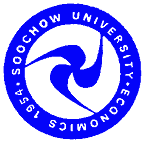|
Department of Economics
Contact us ADD.: No. 56, Sec. 1, GuiYang St., Taipei City TEL.: Chairperson Office: (02) 23111531 Ext. 2660 Undergraduate Program Office: (02) 23111531 Ext. 2661, 2670-2674 FAX: +886-2-23822001 Email: econ@scu.edu.tw
Introduction In 1900, the original Soochow University was established by the Methodist Church as a merger of three existing institutions: the Buffington Institute and the Kung Hang School in the city of Soochow (now spelled Suzhou), and the Anglo-Chinese College in Shanghai. As the university was located in Suzhou, it was named Soochow University (in English) and has kept the alias "東吳大學” (in Chinese) for over 100 years. In 1951, the reunion of the Soochow alumni in Taiwan suggested that the school be rebuilt. In 1954, after the approval from the Ministry of Education, the university was rebuilt through the many efforts of the alumni. As the economic development of Taiwan was at its beginning, the Department of Economics was established as part of the School of Law, at the time the school was rebuilt, to meet the economic trends and to cultivate financial and economic professionals. In 1969, the whole university was restored and the Department of Economics was placed under the School of Business. Since then students were able to study under the environment emphasizing both theory and practice. Due to the department’s excellence in teaching, the Night-Time Program and the Graduate Program were established in 1970 followed by the PhD Program in 1989. Since 1995, outstanding students in the Master’s program can apply directly to the PhD program. Moreover, starting from 1998, undergraduate admission was open to students who apply through a recommendation-based system and students responded enthusiastically to this new admission policy. Currently, students enrolled in the undergraduate program are divided into three classes. The admitted undergraduate students mainly come from three admission processes -- the star recommendation program, individual applications, and entrance exam distributions. The executive Master’s program was established in 1999 and the "5-year undergraduate-graduate curriculums program” started from 2008.
Highlight of Development Objective: Cultivation of economic professionals with independent thinking skills, professional abilities, and global macro views. Based on the guideline of "steady development and improvement”, the department trains economic professionals with various kinds of expertise for the country. Students can use what they learn both for employment and further studies and to contribute to the economic development of Taiwan. Each program provides students with the following abilities: The Undergraduate Program:
The Master’s and Executive Master Program:
The PhD Program: Knowledge of advanced economic theories and ability to do research independently.
Features |
|
|
In order to cultivate economic professionals, the department’s curriculum design emphasizes knowledge on economic theory and quantitative methods, supplemented by application and practice courses. Students learn to interpret economic data and financial news, perform economic analysis on international finance, economy and trade of China and various industries so they can become economic professionals with independent thinking and analytical abilities. The courses offered by the department fully combine theory and practice. The purpose is two-fold. Firstly, they aim to strengthen the students’ training in economic theory. Secondly, they aim to stimulate learning interests by allowing students to analyze various economic indicators, interpret economic and financial news, and learn from diverse teaching activities so students can be equipped with economic and financial expertise and execution abilities after they finish studying those courses. Teachers in the Department of Economics have very diverse teaching and research expertise. They have global views and serve the department by allocating their obligations efficiently and providing counseling services to students enthusiastically. Because of the administrative support from the secretaries, teaching and counseling support from the teaching assistants, and the generous donation from the alumni, the faculty and staff members are able to interact very well with students and to work together with the guidance of General Education to cultivate economic professionals with independent thinking skills, professional abilities, and global views.
Department Logo 
|



